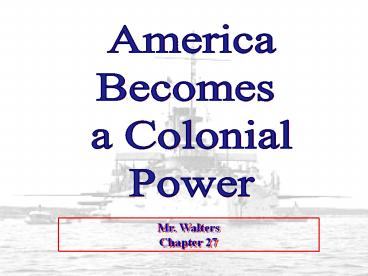America Becomes A Colonial Power - PowerPoint PPT Presentation
Title:
America Becomes A Colonial Power
Description:
Mr. Walters Chapter 27 The American Anti-Imperialist League Founded in 1899. Mark Twain, Andrew Carnegie, William James, and William ... – PowerPoint PPT presentation
Number of Views:130
Avg rating:3.0/5.0
Title: America Becomes A Colonial Power
1
America Becomes a Colonial Power
Mr. WaltersChapter 27
2
Essential Question What propelled the US to
join the Imperialism party?
3
1. Commercial/Business Interests
U. S. Foreign Investments 1869-1908
4
2. Military/Strategic Interests
Alfred T. Mahan ? The Influence of Sea Power on
History 1660-1783
5
3. Social Darwinist Thinking
The White MansBurden
The Hierarchyof Race
6
4. Religious/Missionary Interests
American Missionariesin China, 1905
7
5. Closing the American Frontier
8
Hawaii Gas Station of the Pacific"
9
U. S. View of Hawaiians
Hawaii becomes a U. S. Protectorate in 1849
by virtue of economic treaties.
10
Hawaiian Queen Liliuokalani
Hawaii for the Hawaiians!
11
U. S. Business Interests In Hawaii
- 1890 McKinley Tariff
- 1893 Americanbusinessmen backed anuprising
against Queen Liliuokalani. - Sanford Ballard Dole proclaims the Republic of
Hawaii in 1894.
12
To The Victor Belongs the Spoils
Hawaiian Annexation Ceremony, 1898
13
Japan
14
Commodore Matthew Perry Opens Up Japan 1853
The Japanese View of Commodore Perry
15
Treaty of Kanagawa 1854
16
Gentlemans Agreement 1908
- A Japanese note agreeing to deny passports
tolaborers entering the U.S. - Japan recognized the U.S.right to exclude
Japaneseimmigrants holding passportsissued by
other countries. - The U.S. government got theschool board of San
Francisco to rescind their order tosegregate
Asians in separateschools.
- 1908 ? Root-Takahira Agreement.
17
Root-Takahira Agreement 1908
- A pledge to maintain the status quo in the Far
East. - Recognition of Chinas independence and
territorial integrity, and support for
continuation of the Open-Door Policy. - An agreement to mutual consultation in the event
of future Far Eastern crises.
18
Cuba
19
The Imperialist Tailor
20
Spanish Misrule in Cuba
21
Butcher Weylers Reconcentration Policy
22
Yellow Journalism Jingoism
Joseph Pulitzer
Hearst to Frederick Remington You furnish
the pictures, and Ill furnish the war!
William Randolph Hearst
23
De Lôme Letter
- Dupuy de Lôme, SpanishAmbassador to the U.S.
- Criticized PresidentMcKinley as weak and
abidder for the admirationof the crowd,
besidesbeing a would-be politicianwho tries to
leave a dooropen behind himself whilekeeping on
good termswith the jingoes of hisparty.
24
Theodore Roosevelt
- Assistant Secretary of the Navy in the McKinley
administration. - Imperialist and American nationalist.
- Criticized PresidentMcKinley as having the
backbone of a chocolate éclair! - Resigns his position to fight in Cuba.
25
The Rough Riders
26
Remember the Maineand to Hell with Spain!
Funeral for Maine victims in Havana
27
The Spanish-American War (1898)That Splendid
Little War
How prepared was the US for war?
28
The Philippines
29
The Spanish-American War (1898)That Splendid
Little War
30
Dewey Captures Manila
31
Emilio Aguinaldo
- Leader of the FilipinoUprising.
- July 4, 1946Philippine independence
32
Our Sphere of Influence
33
The Treaty of Paris 1898
- Cuba was freed from Spanish rule.
- Spain gave up Puerto Rico and the island ofGuam.
- The U. S. paid Spain20 mil. for
thePhilippines. - The U. S. becomesan imperial power!
34
The American Anti-Imperialist
League
- Founded in 1899.
- Mark Twain, Andrew Carnegie, WilliamJames, and
WilliamJennings Bryan amongthe leaders. - Campaigned against the annexation of
thePhilippines and otheracts of imperialism. - WHY?
35
Cuban Independence?
- Teller Amendment (1898)
- Platt Amendment (1903)
- Cuba was not to enter into any agreements with
foreign powers that would endanger its
independence. - The U.S. could intervene in Cuban affairs if
necessary to maintain an efficient, independent
govt. - Cuba must lease Guantanamo Bay to the U.S. for
naval and coaling station. - Cuba must not build up an excessive public debt.
Senator Orville Platt
36
Panama
37
Panama The Kings Crown
- 1850 ? Clayton-Bulwer Treaty.
- 1901 ? Hay-Paunceforte Treaty.
- Philippe Bunau-Varilla,agent provocateur.
- Dr. Walter Reed.
- Colonel W. Goethals.
- 1903 ? Hay-Bunau- Varilla Treaty.
38
Panama Canal
TR in Panama(Construction begins in 1904)
39
The Roosevelt Corollary to the Monroe Doctrine
1905
Chronic wrongdoing may in America, as elsewhere,
ultimately require intervention by some civilized
nation, and in the Western Hemisphere the
adherence of the United States to the Monroe
Doctrine may force the United States, however
reluctantly, in flagrant cases of such wrongdoing
or impotence, to the exercise of an international
police power .
40
Speak Softly,But Carry a Big Stick!
41
China
42
Stereotypes of the Chinese
Immigrant
Oriental Chinese Exclusion Act, 1887
43
The Boxer Rebellion 1900
44
The Open Door Policy
- Secretary John Hay.
- Give all nations equalaccess to trade in China.
- Guaranteed that China would NOT be taken over by
any one foreign power.
45
TheOpen Door Policy
46
America as a Pacific Power
47
America's New Role
48
The Cares of a Growing Family
49
Constable of the World
50
Treaty of Portsmouth 1905
Nobel Peace Prize for Teddy
51
The Great White Fleet 1907































